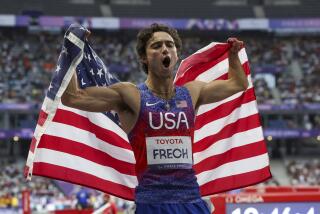NBC’s London Olympics ratings defy expectations
NBC’s coverage of the London Olympics has blown away the most optimistic projections for audience performance in an increasingly fractured media landscape.
More than 210 million Americans have watched a portion of the Games. The network attracted an average of about 32 million viewers a night in prime time — though the time difference with London meant NBC was showing highlights from events that occurred long before the telecast.
Younger viewers, including those typically tethered to laptops or cellphones, have been watching the coverage, often with groups of friends. Even consumers who have digital video recorders and could easily fast-forward through commercials have hung on through the ads.
“The Olympics have defied media gravity,” said Alan Wurtzel, president of research for parent company NBCUniversal. NBC’s ratings are on track to outdistance numbers from the 2008 Beijing Olympics, which many TV industry executives had figured would be a high-water mark. The last Summer Olympics to consistently attract such large crowds were the Montreal Games in 1976 — long before cable TV networks began splintering the audience.
The London Games will rank in the top five TV events of all time for several reasons, Wurtzel said. More people have smartphones and tablets that can stream video. More people are using social media. And more people are staying closer to home to save money because of the sluggish economy.
In addition, viewers have been craving uplifting fare after a stream of bad news, including the drought and mass shootings. Reality show ratings have slipped this year, perhaps a result of viewer fatigue. Instead of Nicole “Snooki” Polizzi from “Jersey Shore,” viewers this summer have been enchanted with newly minted role models, including swimmer Missy Franklin and gymnast Gabrielle Douglas, and at least one returning favorite, swimmer Michael Phelps.
“It’s been very surprising that the audience levels have been up double digits compared to Beijing in every major demographic target, despite the fact that most people already knew the event results when they sat down to watch,” said Miraj Parikh, director of investment at Spark, a Chicago-based advertising firm.
Heading into the Games, NBCUniversal executives worried that they could lose as much as $200 million on their coverage. The company paid $1.18 billion to the International Olympic Committee for the exclusive U.S. television rights as part of an arrangement struck nine years ago when NBC was controlled by General Electric Co. Production costs added at least $100 million. (Last year, the company agreed to pay the IOC $4.4 billion for the U.S. TV rights to the next four Olympic Games from 2014 to 2020.)
But now, company executives expect to break even on the London Games. NBCUniversal sold about $1.3 billion worth of ads for its six TV networks, digital platforms and local TV stations. Advertisers that bought time at the last minute forked over nearly $900,000 for a 30-second spot on NBC.
“This year is drawing more advertiser interest,” said Kirsten Atkinson, media director for Team One, an El Segundo-based advertising agency, which makes ad buys for its client car company Lexus.
“Social media has really been driving the engagement,” Atkinson said. “Everyone thought digital platforms would take audience away from television, but what it has done is given us extended engagement and reach.”
A survey of 1,005 people, conducted last weekend by the Pew Research Center, found that 73% of respondents watched the Olympics on television. Meanwhile, 17% said they saw events online or digitally, on a cellphone or a tablet, and 12% said they followed the coverage on social media sites.
“The expectation was that mega-events would be smaller than they were in the pre-Internet age, but that hasn’t happened,” said Lee Rainie, director of the Pew Research Center’s Internet & American Life Project. “More people think of television now as a shared cultural experience. It’s another way for them to feel like they are participants, and that’s exciting.”
The Pew center found that 31% of Americans aged 18 to 29 had followed Olympics coverage on social networking sites such as Facebook and Twitter, compared with 11% of those aged 30 to 49. Among those following the Games online, nearly 80% said they also had been watching on television.
NBC research has found that nearly 70% of children have been watching the Olympics with their parents. Olympics viewing among teenagers is up 27% compared with Beijing.
“You have this younger generation of athletes stepping up, and the younger viewers are coming over to broadcast from the younger-skewing cable networks to watch them,” said Kevin Collins, director of national broadcast for the New York-based ad-buying firm Initiative. “There have been so many exciting story lines.”
After the Games, NBC will comb through the research and statistics gleaned during the last two weeks to begin planning future coverage.
“People are at home, they are watching the big-screen TV and they have their smartphone or tablet in their hand, looking up stats or tweeting,” NBC’s Wurtzel said. “In September, when we begin to analyze this huge amount of data, we will really begin to understand how people are consuming media. That’s why we call the Olympics our billion-dollar lab. We get to see the future of media behavior.”
More to Read
Inside the business of entertainment
The Wide Shot brings you news, analysis and insights on everything from streaming wars to production — and what it all means for the future.
You may occasionally receive promotional content from the Los Angeles Times.











